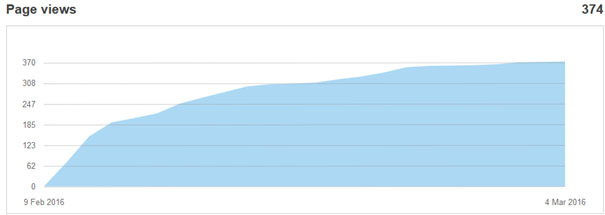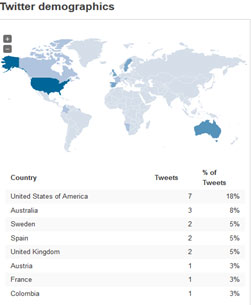Analyse zur Verbreitungsstrategie des Policy Briefs zu „Sozial- und Geisteswissenschaften im IPBES“, März 2016
In einem Gastbeitrag stellt Dr. Alice B.M. Vadrot, Visiting Research Fellow, Centre for Science and Policy, Universität Cambridge sowie Erwin Schrödinger Fellow, Austrian Research Fund (FWF) als eine der beteiligten Wissenschaftlerinnen an den beiden Veröffentlichungen zur Stärkung von Sozial- und Geisteswissenschaften in IPBES eine erste Analyse der bisherigen Resonanz zur Verbreitung und Aufnahme des Policy Briefs sowie der assoziierten Korrespondenz im Fachmagazin Nature vor.
Der als ein wichtiges Ergebnis aus dem Expertenworkshop zur Rolle der Sozial- und Geisteswissenschaften in IPBES hervorgegangene Policy Brief wurde zu den IPBES Stakeholder-Tagen (20.- 21.02.2016 in Kuala Lumpur, Malaysia) sowie der vierten Sitzung der IPBES-Vollversammlung (22.-28.02.2016 in Kuala Lumpur, Malaysia) vorgelegt. Dr. Alice Vadrot1, eine der beteiligten Wissenschaftlerinnen an den beiden Veröffentlichungen zur Stärkung von Sozial- und Geisteswissenschaften, hat eine erste Analyse der bisherigen Verbreitung und Diskussion des Policy Briefs sowie der kurzen Korrespondenz im Fachmagazin Nature durchgeführt.
Follow-up of the effects of the workshop titled social sciences and humanities in the Intergovernmental Platform on Biodiversity and Ecosystem Services (IPBES). The workshop was held on 12 November 2015 in Bonn, Germany.
Dissemination of workshop results at IPBES-4: Overview prepared by Dr. Alice Vadrot (07.03.2016)
The recommendations and associated policy options on how to embed the social sciences and humanities (SSH) in the IPBES were recognised during the fourth Plenary Meeting of the IPBES (IPBES-4) held in Kuala Lumpur (Malaysia) from 22 February to 29 February 2016 and the preceding stakeholder days. The dissemination strategy included the distribution of hard copies and the use of social media to reach audiences beyond the persons physically present at IPBES-4.

500 hardcopies of the results of the one-day multidisciplinary expert meeting in Bonn were distributed to policy-makers, experts, stakeholders, and observers present at the stakeholder days and the plenary session of IPBES-4. The importance of social sciences and humanities for the successful implementation of the first Work Programme of the IPBES, the forthcoming nomination process of experts for the first global assessment, and the relevance of SSH skills for the review procedure of the platform were expressed by many national delegates and stakeholders throughout the meeting. The document was used, inter alia, by the Knowledge & Data Technical Support Unit of the IPBES as a reference for arguing that the quality of the IPBES processes and products could be increased by tackling the prevailing disciplinary imbalance.
The Executive Secretary of IPBES, Dr. Anne Larigauderie, referred to the engagement of social sciences and indigenous and local knowledge (ILK) in her progress report (ENB 23.02.2016). Marie Stenske, member of the Multidisciplinary Expert Panel (MEP, stressed the need to invite experts from the social sciences and humanities during the work of IPBES Contact Group One (ENB 28.02.2016) and Najib Razak, Prime Minister of Malaysia, underscored “the importance of collaboration between governments and natural and social scientists to achieve the right balance between protecting the environment while ensuring social and economic progress and poverty eradication” (ENB 23.02.2016).
In order to reach relevant audiences beyond those physically present in Kuala Lumpur, the results of the Bonn workshop were shared via Twitter (#IPBES4), which led to great response and recognition. The Tweet included a link to the PDF version of the policy brief and triggered several responses: It was cited, retweeted, and liked by individuals and organisations, such as bioDiSCOVERY, a core project of Future Earth, stressing the quality of the ideas and the suitability of the recommendations.
The brief correspondence in NATURE, which is based on the discussions of the workshop in Bonn in November 2015 and was made available online shortly before the start of IPBES-4, has had a significant impact on the visibility of the topic beyond the core audience present at IPBES-4. The article metrics developed by Nature show that online attention to the correspondence is in the 34 percentile (ranked 468th) of the 712 tracked articles of a similar age in Nature.


The Tweets reached the number of 40, mostly from the U.S., Australia, and European Countries. The link to the comment was shared on Facebook and the page was viewed by more than 360 persons. (Source: Link)
In early March 2016, immediately after IPBES-4, scientists of the German Network-Forum for Biodiversity Research (NeFo) responded to the brief correspondence published in Nature. Their detailed statistical analysis “indicated that most people who applied for the assessments had a background in natural sciences (see go.nature.com/pexril).” (Reuter et al. 2016).
1 Frau Prof. Alice B.M. Vadrot ist heute Stellvertretende Institutsleiterin im Bereich Internationale Politik und Umwelt an der Universität Wien, Österreich




